David Gamon, PhD
Dr. David Gamon, one of the original writers at ScienceIQ, studied cognitive science at U.C. Berkeley, where he received his Ph.D. in Linguistics in 1997. He is the author of many popular books about the human brain, including Building Mental Muscle, Use It Or Lose It!, and Brains That Work a Little Bit Differently. His current projects include books about gender differences in the brain, the brain’s construction of sensory reality, and psychopathy.

Science Facts Written by David Gamon, PhD
Synchronicity
There's something called synchronicity that we've probably all experienced at one time or another. Some people prefer the term 'meaningful coincidence.' You're thinking about your friend from high ... Continue reading

Why Are Yawns Contagious?
Lots of animals yawn. It's a primitive reflex. Humans even begin to yawn before birth, starting about 11 weeks after conception. But contagious yawning doesn't start until about age 1 or 2. And even ... Continue reading

What's So Funny?
There's an oft-repeated scientific definition of laughter as one or more forcibly voiced, acoustically symmetric, vowel-like notes (75 ms duration) separated by regular intervals (210-218 ms), and a ... Continue reading

Brain Waves
Your brainwaves normally vary from a low vibrational state of about one Hz ('Hertz,' or vibrations per second) to a high of about 30 Hz. The highest-frequency vibrations, ranging from about 13 to 30 ... Continue reading

Butterflies In Your Brain
The idea behind chaos theory is that complex systems have an inherent element of unpredictability. The human brain certainly qualifies as a complex system. It is also a chaotic system. It does not ... Continue reading

What's Blindsight?
Some people become blind after suffering an injury to their primary visual cortex at the back of their brain. Since the visual processing part of their brain is damaged, they can't see. Or can they? ... Continue reading
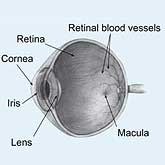
The Self-less Gene?
The dictionary defines altruism as 'an unselfish concern for the welfare of others.' That's the kind of behavior that rescue workers showed in the 9-11 attack on the World Trade Center, and many of ... Continue reading
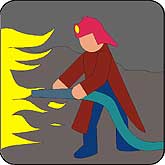
Coffee: Beverage Of Sedition
Coffee is the most popular drink in the world, consumed regularly by about one-third of the global population. Tea runs a close second. And then, of course, there's Coca-Cola. Why are coffee, tea, and ... Continue reading

There's A Lot More To Vision Than Meets The Eye
Have you ever heard of Anton's Syndrome? It's a bizarre medical disorder involving a dramatic mismatch between sensory input and conscious awareness. Why is the syndrome bizarre? Not because the ... Continue reading

Neurogenesis
Until recently, any doctor would have told you that when you lose brain cells, you can never replace them. Scientists now know that the human brain has the ability to regenerate brain cells, or ... Continue reading
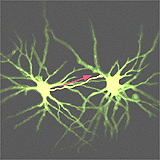
Respect Your Nose
Our language seems to indicate that we think of the world as divided up into things that 'smell' and things that don't. Garbage smells. Groceries don't. A dirty sock smells. A clean one doesn't. That ... Continue reading

Did You Smell Something?
There's not a moment of our lives when smells -- or, more precisely, odor molecules -- aren't impacting our brain. It's been estimated that it takes at least 40 molecules of a given odor for us to be ... Continue reading
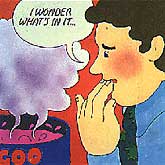
How Much Coffee Will Kill You?
With the spread of Starbucks franchises all the way from Portland to Poughkeepsie, Americans are getting used to paying $3 or more for a proverbial ten-cent beverage. Of course, you get a bigger cup, ... Continue reading

Word Power of the Very Young
Before they turn 2, most children have a vocabulary of about 50 words. From 1st to 5th grades, according to some estimates, their vocabulary increases by about 30,000 words. That's 20 words a day! How ... Continue reading
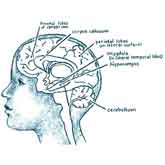
The Strange Case Of Phineas Gage
Long before the advent of neuroscience, brain injuries have been used to deduce how the brain is organized into separate regions handling separate tasks. Consider the case of Phineas Gage, a ... Continue reading

Monkey See Monkey Do: Mirror Neurons May Lie At The Root Of Language
Self-awareness, the ability to infer the mental states of others, and language are considered uniquely human cognitive skills. But they didn't spring into the human brain out of nowhere. A ... Continue reading

A Little OCD In Me And Thee?
Obsessive-Compulsive Disorder (OCD) may not get as much attention as learning disorders such as dyslexia and ADHD, but its rate of occurrence (about 2 to 3 percent) makes it more common than asthma or ... Continue reading

Which Came First? The Words or the Melody?
There's good evidence that we're born into the world with an innate understanding of music, and a natural response to it. You don't need to be a child psychologist to know that babies don't have to be ... Continue reading

New Ideas About An Old Puzzle
There's a familiar way of talking about language as a 'tool,' but of course that's just a metaphor. Literal tools made of rock can last for millennia as evidence of the skills of early humans. Not so ... Continue reading

Welcome to1984
You've probably heard reports about a recently-developed technological device that may help quadriplegics regain control of their limbs. The device is designed to read the quadriplegic's brain waves, ... Continue reading

Hey Nose-Brain!
Sex, food, and smell are linked in our brain by ancient pathways governing appetite, odor detection, and hormones. In fact, another name for the brain's limbic system (a primitive ... Continue reading
![The nose-brain, a.k.a. the limbic system, is comprised of [1] the hypothalamus, [2] the amygdala and [3] the hippocampus.](/images/FactsImages/ACF36F.jpg)
We Live In Two Distinct Visual Worlds
Have you ever wondered what it would be like to live on a planet where all the colors were different from what you're used to? Actually, you already have a lot of experience with two different worlds ... Continue reading

Do Blind People Dream?
Dreams are a universal feature of the human mind. Carl Jung even believed that visions in our dreams offer glimpses into universal archetypes, instinctive primordial images deriving from a collective ... Continue reading
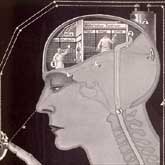
Vibrational Energy
Why is hearing such a rich and powerful sense? Maybe because it alone of all the senses has the power to fill our entire body with vibrational energy. We sometimes think of hearing as one of the ... Continue reading
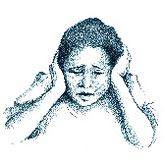
What Are Stem Cells?
When an egg is fertilized by a sperm cell, it quickly becomes a single cell from which all cells of the body-to-be will be created. This 'mother of all cells' is what biologists call a totipotent stem ... Continue reading
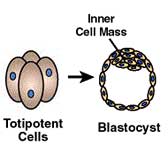
Billions and Billions
Nobody really knows how many brain cells anybody has, but typical estimates are around 200 billion. You've heard the late Carl Sagan talk about 'billions and billions of stars' in the universe. Think ... Continue reading
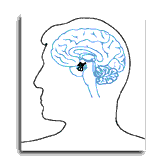
Why Tree Twig Twine Twists Tongues
Even though we call it a 'tongue twister,' it isn't really your tongue that has a hard time saying 'sixth sick sheik's sixth sheep's sick.' It's not all that rare for people to make mispronunciations ... Continue reading

A Tickle is All in the Timing
It's often been noted that no matter how hard you might try, you can't tickle yourself. Why not? Whether it's your finger or someone else's, a prod in the ribs is a prod in the ribs. Why should only ... Continue reading
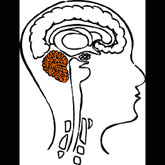
Your Senses Make Sense of Energy
Your different sense receptors are designed to gather different kinds of sensory information about the world around you. That information is in the form of different kinds of energy. Your eyes sense ... Continue reading
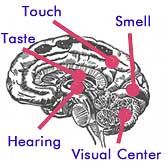
Left Nostril Right Brain
A recent experiment performed by researchers at Philadelphia's Monell Chemical Senses Center, probably the world's pre-eminent institution devoted to the study of smell, showed that the world smells ... Continue reading

